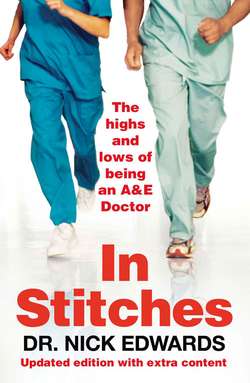Читать книгу In Stitches - Nick Edwards, Dr. Nick Edwards - Страница 7
Management madness
ОглавлениеIf politicians tell you that by instilling the ethos of the private sector we can improve the efficiency of the NHS and improve patient care, then let me tell you that is rubbish. What is needed is good old-fashioned common sense and cooperation. Unfortunately, this is difficult to put on a balance sheet.
Let me give you an example that really upset me. An old man who had Alzheimer’s and was in a nursing home tripped and fell and banged his head. He was on his way to the toilet, but had forgotten that he normally needed a frame and a nurse to help him. He sustained a laceration to his forehead. He needed five stitches, and then to go home. He arrived at 11 p.m.
It was a very quiet night. I was asked to see him straight away as the nurse in charge knew that we could discharge him back very quickly. Fifteen minutes later he was ready for discharge and the ambulance crew that had brought him in were still having a chat and coffee with us all. The charge nurse asked if they would take him back and they didn’t mind at all. They called the coordinator at the control centre (someone who has never worked on an ambulance). He told them that they couldn’t take the patient back to his nursing home, as our hospital (to save money) had changed the terms of contract with the ambulance trust and no non-essential transfers were to be done after 11 p.m. The ambulance man protested and explained that there were three ambulances in the locality, all with their feet up. He said he didn’t mind doing it as it was for the old man’s benefit. Control responded with a statement about breaking contractual obligations, setting a precedent and influencing future contract negotiations.
Further protests ensued. The man was not safe to get a taxi on his own but was still well enough to go back to his nursing home. There was a willing crew who were free at the time and I couldn’t see the problem. I tried to intervene and told control about how the man was confused and distressed about coming into hospital. I explained that staying in hospital until 9 a.m. the next morning would make him worse. However, I was told that the 3 percent funding shift resource allocation caused by the contract change had meant that they could no longer do goodwill gestures such as I had requested.
It was ridiculous. For no good reason beyond disjointed management decisions – made introspectively, without thinking about the consequence for the whole NHS – this man had to stay in an A&E ward for 10 hours. He became very upset and distressed. A&E later became much busier and our nurses didn’t have time to take him to the toilet and so he soiled himself. He screamed all night because he was confused and disorientated in this strange place and the patients in the bed next to him slept very poorly. I was then asked to prescribe sedatives for the patients in the A&E ward, and for him!
I just don’t understand what is happening in management; I don’t think that management understands what is happening on the A&E ‘shop floor’. I found out from one of the senior A&E nurses that the contract decision was changed to save a very small amount of money. Managers would have slapped themselves on their backs for their ‘efficiency’ savings to the transport budget, but not realised that it would not have saved the hospital, or the NHS as a whole, a single penny (the patient still needed to go back in the morning!).
I was annoyed with our managers, but why did the ambulance control man act in the way he did? A few years ago, the crews would have taken these patients back if they were quiet – contract or no contract – for the good for the patient. I suppose nowadays people are instructed to do stuff only if it is for the good of the targets and common sense has flown out of the window.
I got very stressed and angry about this. After a while the junior doctor working with me asked why I was so irate. I explained that, apart from an irate personality disorder and the fact that ranting is my form of therapy, I was genuinely upset. Apart from my lovely family and useless football team, the things I care most about are my patients’ care and the state of the NHS. It upsets me that crappy management decisions done in the name of ‘efficiency’ bugger up both.
P.S. If there are any politicians/managers wanting to see the actual effect of NHS policies (both good and bad) on patient care, please ask your local A&E department if you can spend a night working alongside the doctors and nurses. You will learn more about the problems in that one night, than you ever will from looking at a balance sheet or ‘throughput’ data that A&E departments send their hospital managers.
P.P.S. If you think I will ever talk about how awful things are, please be assured that some things have improved dramatically over the last few years, it is just that I want them to continue improving and not get worse again. Also, when there are no problems, I do not get angry and so do not feel the need to write. So, if you think everything I say is biased, then, yes, you are right. But biased for the right reason: to try and get things changed for the better … and to help with my stress relief.
